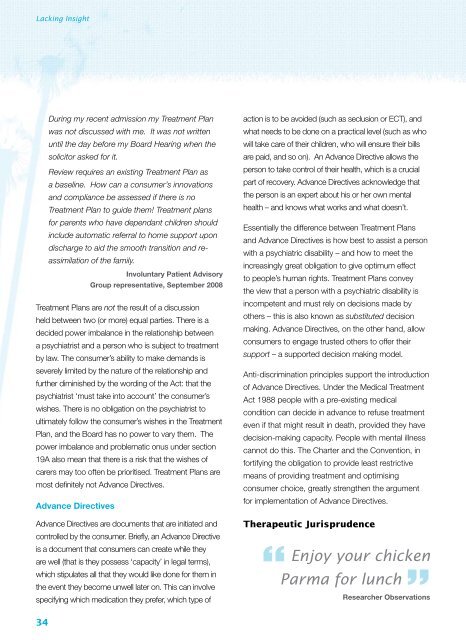Lacking Insight - Community Law
Lacking Insight - Community Law
Lacking Insight - Community Law
- No tags were found...
Create successful ePaper yourself
Turn your PDF publications into a flip-book with our unique Google optimized e-Paper software.
<strong>Lacking</strong> <strong>Insight</strong>During my recent admission my Treatment Planwas not discussed with me. It was not writtenuntil the day before my Board Hearing when thesolicitor asked for it.Review requires an existing Treatment Plan asa baseline. How can a consumer’s innovationsand compliance be assessed if there is noTreatment Plan to guide them! Treatment plansfor parents who have dependant children shouldinclude automatic referral to home support upondischarge to aid the smooth transition and reassimilationof the family.Involuntary Patient AdvisoryGroup representative, September 2008Treatment Plans are not the result of a discussionheld between two (or more) equal parties. There is adecided power imbalance in the relationship betweena psychiatrist and a person who is subject to treatmentby law. The consumer’s ability to make demands isseverely limited by the nature of the relationship andfurther diminished by the wording of the Act: that thepsychiatrist ‘must take into account’ the consumer’swishes. There is no obligation on the psychiatrist toultimately follow the consumer’s wishes in the TreatmentPlan, and the Board has no power to vary them. Thepower imbalance and problematic onus under section19A also mean that there is a risk that the wishes ofcarers may too often be prioritised. Treatment Plans aremost definitely not Advance Directives.Advance DirectivesAdvance Directives are documents that are initiated andcontrolled by the consumer. Briefly, an Advance Directiveis a document that consumers can create while theyare well (that is they possess ‘capacity’ in legal terms),which stipulates all that they would like done for them inthe event they become unwell later on. This can involvespecifying which medication they prefer, which type of34action is to be avoided (such as seclusion or ECT), andwhat needs to be done on a practical level (such as whowill take care of their children, who will ensure their billsare paid, and so on). An Advance Directive allows theperson to take control of their health, which is a crucialpart of recovery. Advance Directives acknowledge thatthe person is an expert about his or her own mentalhealth – and knows what works and what doesn’t.Essentially the difference between Treatment Plansand Advance Directives is how best to assist a personwith a psychiatric disability – and how to meet theincreasingly great obligation to give optimum effectto people’s human rights. Treatment Plans conveythe view that a person with a psychiatric disability isincompetent and must rely on decisions made byothers – this is also known as substituted decisionmaking. Advance Directives, on the other hand, allowconsumers to engage trusted others to offer theirsupport – a supported decision making model.Anti-discrimination principles support the introductionof Advance Directives. Under the Medical TreatmentAct 1988 people with a pre-existing medicalcondition can decide in advance to refuse treatmenteven if that might result in death, provided they havedecision-making capacity. People with mental illnesscannot do this. The Charter and the Convention, infortifying the obligation to provide least restrictivemeans of providing treatment and optimisingconsumer choice, greatly strengthen the argumentfor implementation of Advance Directives.Therapeutic Jurisprudence“Enjoy your chickenParma for lunch”Researcher Observations
















